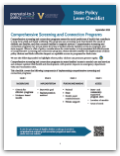Reducing the administrative burden for the Supplemental Nutrition Assistance Program (SNAP) increases participation rates among eligible households, increasing household food security.
This State Policy Lever Checklist contains a list of policy considerations for state leaders to help maximize the effectiveness of SNAP. It also underscores the implications of these policy choices and their collective impact on equitable access to SNAP for eligible families in their state.
This checklist covers the following policy levers, which can impact the administrative burden for SNAP:
- Recertification
- Reporting requirements
- Online services
- Maximizing benefits




